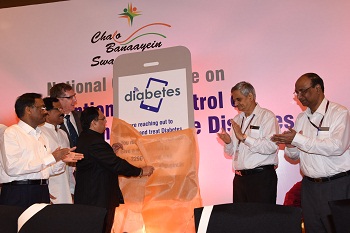Strengthening India’s Response to Noncommunicable Diseases
To accelerate the response to the growing burden of noncommunicable diseases (NCDs) in India through multisectoral actions, the Ministry of Health & Family Welfare (MoHFW) in collaboration with the WHO Country Office for India organized a National Conference on Prevention and Control of Major Noncommunicable Diseases in India on 22 June 2016.
Experts came together to discuss prevention and control of NCDs in India, with a focus on the involvement of non-health ministries and other sectors, developmental partners, the civil societies and private players in advancing health promotion and prevention of NCDs risk factors.
“Prevention of disease will always remain in the forefront, whether for communicable or noncommunicable diseases, and awareness regarding a balanced lifestyle and healthy living is a crucial pillar in combating non-communicable diseases”, stated Shri J. P. Nadda, Union Minister of Health and Family Welfare.
Amongst other stakeholders and dignitaries present on the occasion were Mr Jagat Prakash Nadda, Union Minister of Health & Family Welfare; Mr Shripad Yesso Naik, Minister of State for Health & Family Welfare and Minister of State (IC), AYUSH; Mr B.P. Sharma, Secretary Health, MoHFW; Dr Soumya Swaminathan, Director General, Indian Council for Medical Research & Secretary, Department of Health Research; Dr Jagdish Prasad, Director General Health Services, MoHFW; Dr Arun Kumar Panda, Additional Secretary, MoHFW; Mr C.K. Mishra, Additional Secretary and Mission Director, National Health Mission, MoHFW; Mr Anshu Prakash, Joint Secretary, MoHFW; and Mr Manoj Jhalani, Joint Secretary, MoHFW.

Speaking on the occasion, Dr Henk Bekedam, WHO Representative to India said that NCDs represent a major challenge to public health and national development. It is not just the percentage of people dying of NCDs, but premature deaths as defined by dying before the age of 70 years that is critical.
“The good news is that 80% of premature heart disease, stroke and diabetes can be prevented or the onset delayed,” he added.
Dr Bekedam also highlighted that multisectorality is at the heart of an effective response to the growing incidence of NCDs.
The event saw the launch of a number of initiatives: mDiabetes initiative for prevention and control of diabetes; Screening guidelines for Prevention, Early Detection, and Control of Noncommunicable Diseases; Training Manual for reducing NCD risk factors in primary care; Survey for Monitoring the National Noncommunicable Diseases Targets, 2015-16; Global Adult Tobacco Survey, Survey Questionnaire, 2016-17; Health Magazine: Healthy India Initiative, and Awareness Strategies for NCDs.
The consultation evoked active participation and the discussions focused on a broad range of issues to tackle NCDs: the role of non-health sectors in prevention and control of NCDs, surveillance and research for NCDs, and NCD initiatives and experiences at the national and state level. The panelists and speakers strongly agreed that the time to act is now and a shift in thinking is needed for the active engagement of non-health actors.
The deliberations reiterated that the focus should be on the youth of India to bring the change - the change to adopt healthy lifestyles. Catching them young and sensitizing people at large is the key towards managing and controlling the rising burden of NCDs.
Principal Secretaries of eight states presented their experience in implementing innovations for prevention and control of NCDs.
The event also saw the launch of mDiabetes, a free SMS based programme aimed at generating awareness on healthy living, disseminating diabetes specific information and helping diabetics to adhere to the treatment.
The meeting was attended by about 300 stakeholders – policymakers from the national and state governments (including by 23 NCDs state nodal officers), international organizations, Centres of Excellence and WHO Collaborating Centres, academia, civil society organizations, UN agencies, media etc.
